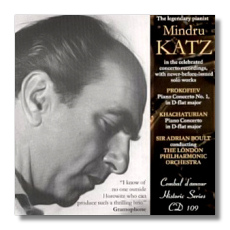
The Internet's Premier Classical Music Source
Related Links
- Latest Reviews
- More Reviews
-
By Composer
-
Collections
DVD & Blu-ray
Books
Concert Reviews
Articles/Interviews
Software
Audio
Search Amazon
Recommended Links
Site News
 CD Review
CD Review
The Legendary Pianist

- Serge Prokofieff:
- Piano Concerto #1
- Tales of the Old Grandmother
- Prélude in C Major, Op. 12, #7
- Aram Khachaturian:
- Piano Concerto
- Toccata
Mindru Katz, piano
London Philharmonic Orchestra/Adrian Boult
Cembal d'amour CD109 ADD 66:19
Cembal d'amour is a New York City-based label that features several recordings by pianist Mordecai Shehori. In the late 60s, Shehori studied with Mindru Katz, a Romanian-born pianist who had immigrated to Israel at the end of the previous decade. It is clear that Shehori's intention was to honor his teacher with this noteworthy release, and with another Katz CD: sonatas by Brahms and Franck with violinist Henryk Szeryng (CD 105).
Born in 1925, Katz studied under Florica Musicescu, who also had taught Dinu Lipatti. After graduating from the Royal Academy of Music in Bucharest, Katz soon began an international career that took him to 40 countries. The booklet notes to this CD list the conductors that he worked with: Barbirolli, Celibidache, Doráti, and others. Katz died in 1978 while performing a Beethoven sonata in Istanbul, Turkey, joining Simon Barere, Dimitri Mitropoulos, and Leonard Warren among the list of musicians who died in the act of making music.
The recordings on this CD, with the exception of the Tales of the Old Grandmother, were licensed from EMI. The recording dates are not indicated anywhere on this release, which is a definite shortcoming. (Instead, most of the booklet space is devoted to Shehori's appreciation of his teacher.) The recordings do speak for themselves, however. Katz's skills have been compared to Horowitz's, both by Gramophone magazine and by Shehori. Indeed, the resemblance is striking when both pianists are asked to make their fingers dance on the piano's higher registers – both produce a bell-like tone that is brilliant but never brittle. Katz plays brilliantly in both of the concertos, avoiding the hardness that is a potential hazard in these works. In the Prokofieff, but especially in the Khachaturian, Katz commands attention with his ringing tone, his authoritatively voiced chords, and the coruscating brilliance of his arpeggios and runs. The Khachaturian can be heavy going if it is not performed with imagination and poetry, two qualities that Katz has in ample amounts. In the smaller works, Katz reveals his skills as a miniaturist and as a storyteller.
Both concertos find Boult in a driving mood. Unfortunately, the London Philharmonic has a tendency to submerge Katz (for example, at the end of the Prokofieff), and the Prokofieff's opening section is compromised by the orchestra's ragged playing. Things improve quickly, however.
For the most part, the engineering is a bit harsh but acceptable. There is an unfortunate technical problem in the last of the three Tales of the Old Grandmother. The master tape has been affected by what sounds like wow; the pitch sags and wavers nauseatingly, and Katz's pianism is thereby negated. It is too bad that this fault could not have been fixed. Failing that, consumers should have been warned about it. For me, it doesn't spoil the CD, but it is a blot on what could have been an enthusiastic recommendation.
More information on Cembal d'amour can be obtained from www.cembaldamour.com.
Copyright © 2000, Raymond Tuttle




















